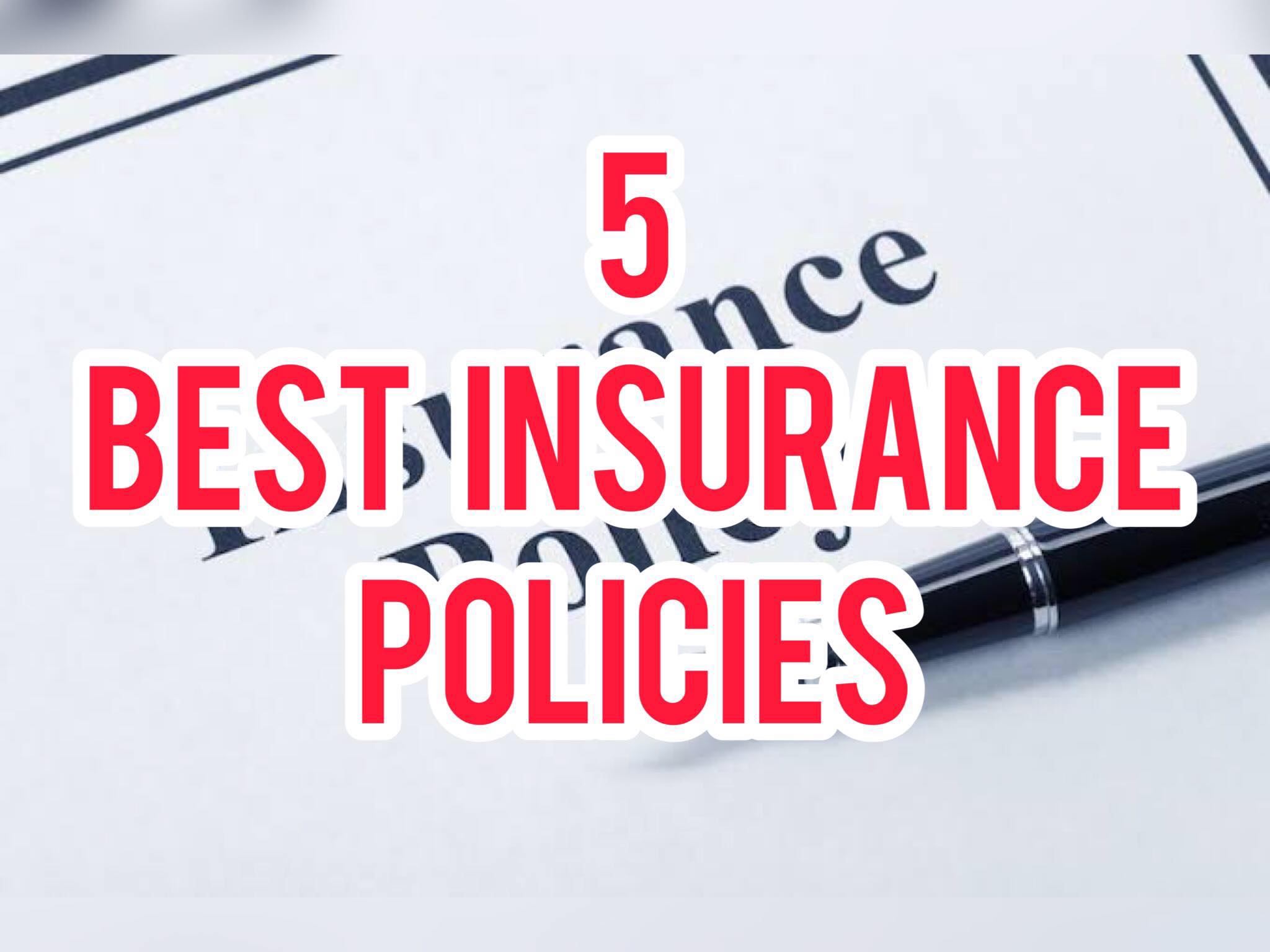5 Best Insurance Policies
You can be protected by an insurance policy from the risks associated with everyday living, such as automobile accidents, life-threatening illnesses, and floods and fires. Disasters cannot be prevented, but a solid insurance plan can offer financial protection for these unforeseen costs.
Making a sound personal financial plan requires protecting your most valuable assets, and the correct insurance coverage may greatly assist you in protecting both your income and your valuables. This article talks about 5 Best Insurance Policies You Should Have.
1. Long-Term Disability Insurance
Some people decide to disregard the possibility of long-term disability (LTD) because it is so terrifying. Even if we all believe that “nothing will ever happen to me,” putting your future financial security in the hands of hope is not a smart idea. Instead, go for a disability policy that offers adequate coverage to let you maintain your standard of living even if you are no longer able to work.
For covered disabilities, long-term disability offers a financial payout equivalent to a percentage (such as 50% or 60%) of the insured’s wage. Usually, short-term disability ends when long-term impairment starts. The impairment must have happened after the policy’s issuance and thereafter, usually after a waiting period, in order to qualify for payments. The insurer must be given medical information, frequently verified by a doctor, for review.
The majority of long-term disability insurance policies classify impairments as being related to one’s own or any work. Own occupation denotes the insured’s inability to carry out their normal employment or a comparable profession as a result of a handicap. Any vocation denotes the insured’s inability to do any work for which they are qualified as a result of their condition.
Workers’ compensation, sometimes known as workers’ comp, is a type of insurance that compensates employees for disabilities or injuries sustained at work or while doing their employment. The majority of states mandate that companies maintain workers’ compensation insurance for their workforce. Employees are forbidden from suing their employer for carelessness in exchange. Workers’ compensation insurance and long-term disability insurance both cover disabilities, although the latter does not just cover illnesses or accidents sustained at or while working.
2. Homeowner’s Insurance
The cost of replacing your home is high. The procedure could go more smoothly if you have the appropriate homeowner’s insurance. When looking for a policy, seek for one that includes coverage for the expense of living somewhere while your house is being restored, as well as the replacement of the building and its contents.
Remember that since you already own the property, the cost of rebuilding does not need to include the cost of the land. The cost to replace your home might be higher or lower than what you bought for it depending on its age and the features it has. Find out what local builders charge per square foot and multiply that amount by the volume of area you need to replace to get an accurate estimate. Remember to account for the price of upgrades and extra features. Make sure the insurance coverage will pay for any liability for accidents that could happen on your property.
Also Read: Best Homeowners Insurance Review 2023
Renters Insurance
Renters also want assurance that, in the case of a loss, they would be made whole. Fortunately, those who rent or lease residences have access to a sort of property insurance called renters insurance. Personal property, liabilities, and supplemental living expenses are all covered by this insurance.
There may be two different forms of property insurance for a single property: renters insurance and homeowner’s insurance. However, the tenant’s personal property is not covered by homeowners insurance. In order to safeguard their valuables, lessees need get renters insurance.
Despite the fact that renters insurance is different from homeowners insurance, they both contain the same elements: coverage for the building (A), coverage for other buildings (B), personal property (C), coverage for additional living costs (also known as loss of use), liability (E), and medical payments (F). Coverages A and B are frequently set to $0 because renters are not responsible for insuring the home or any structures.
The renter’s personal belongings are covered by Coverage C. In the case of a loss, Coverage D offers supplementary compensation for living costs. For instance, Coverage D will pay for the cost of living somewhere if a fire forces the renter out of their house and forces them to pay for a hotel and meals. Coverage F pays for medical costs for visitors of the renter who are on the property with authorization and Coverage E covers injuries and property damage caused by the insured.
3. Health Insurance
Health insurance is essential due to the rising costs of medical treatment. Even a routine trip to the family doctor might incur a substantial expense. A bill for more severe injuries that need a hospital stay may exceed the cost of a week at a five-star resort. Surgery-related injuries can soon cost five figures. Although almost everyone finds the expense of health insurance to be prohibitive, the potential cost of not having coverage is far higher.
4. Life Insurance
The individuals who are financially reliant on you are protected by life insurance. Life insurance should be high on your list of necessary insurance plans if your parents, spouse, kids, or other loved ones might suffer financially as a result of your passing. Consider how much you make annually (and how long you want to work), then get an insurance to replace that income in the case of your untimely death. Include the cost of burial as well, since many families struggle with this unexpected expense.
5. Car Insurance
In most states, having vehicle insurance of any kind is required by law. Automobile insurance is something you shouldn’t forgo, even if you aren’t obliged to have it and you drive an old junk that has been paid off for years. You may face a lawsuit that might cost you everything you own if you cause an accident and someone is hurt or their property is harmed. Accidents occur suddenly, and the outcomes are frequently devastating. You save very little money and put everything you possess at danger if you have no vehicle insurance or merely get the lowest level of coverage.
Also Read: Auto Insurance: Best Review In 2023
Things To Know About Buying Insurance
Insurance plans exist in a number of forms and sizes and offer a wide range of features, advantages, and costs. To be sure you comprehend the coverage and the cost, conduct comprehensive research, read the policies, and speak with a competent insurance expert. Make sure the insurance you buy are sufficient for your needs, and don’t sign anything unless you are completely satisfied.
Consider using an insurance broker, who can look up policies from several insurance providers and discover the coverage that best meets your needs. So that you may compare features, provisions, and prices, request from the broker that they present you with many possibilities. By making an informed choice, take charge of your protection.
Conclusion
Losses are a part of life, but how much they affect us depends on the loss. By providing cash compensation for insured losses, insurance lowers the effect. There are several insurance options, but some are at the top in terms of significance. Everyone should have five different forms of insurance: home or property insurance, life insurance, disability insurance, health insurance, and car insurance.
What Is a Whole Life Insurance Policy?
A whole life insurance policy is a type of permanent life insurance in which the insured person’s death results in the payment of death benefits. As long as premiums are paid on time, the whole life insurance is valid for the duration of the insured’s life. Whole life insurance plans also accrue cash value that may be retrieved during the insured’s lifetime.
What Is a Universal Life Insurance Policy?
The cash value of a universal life (UL) insurance policy, which is a type of perpetual life insurance, can be invested by the policyholder in a different account that contains stock market-linked funds. It is a flexible insurance that allows for adjustable premiums and death benefits.
How Can You Cancel an Insurance Policy?
A policyholder must terminate an insurance coverage in accordance with the contract’s cancellation clauses. Most insurance companies permit consumers to cancel by phone, but some also need a written request.
How Much Does a $1 Million Life Insurance Policy Cost?
The price of a $1 million life insurance policy varies depending on the kind of policy granted (whole or term), the insured’s age, their health, and other underwriting considerations. It may cost a few hundred dollars or tens of thousands. Obtaining estimates from a life insurance agent or broker is the most effective approach to learn how much a $1 million policy would cost you.
What Is an Umbrella Insurance Policy?
Liability insurance with more coverage than the policyholder’s existing policy limitations is known as an umbrella policy. For instance, the umbrella policy will give extra liability coverage, up to the policy limits, if damages exceed the limits of a policyholder’s property insurance (such as house or vehicle insurance). The people who have sizable assets that may be seized are the ones who profit from this form of insurance the most.
What Is the Declarations Page of an Insurance Policy?
The section of the insurance contract that contains the general policy information is called an insurance policy declarations page. The policy owner, insured, face amount of coverage, and terms & conditions are listed on this page.
What Is the Cash Value of a Life Insurance Policy?
The amount that has accrued in a life insurance policy over and above the premiums is known as the cash value of the policy. A permanent life insurance policy’s cash value is the savings portion that builds interest and may be accessed by the policy owner in the form of a cash withdrawal or a loan.

Sage is a financial/consumer journalist and senior editor, personal finance, of TrendsHQ. EXPERTISE: Personal Finance, Careers, Jobs, Scholarships, and Entertainment.
